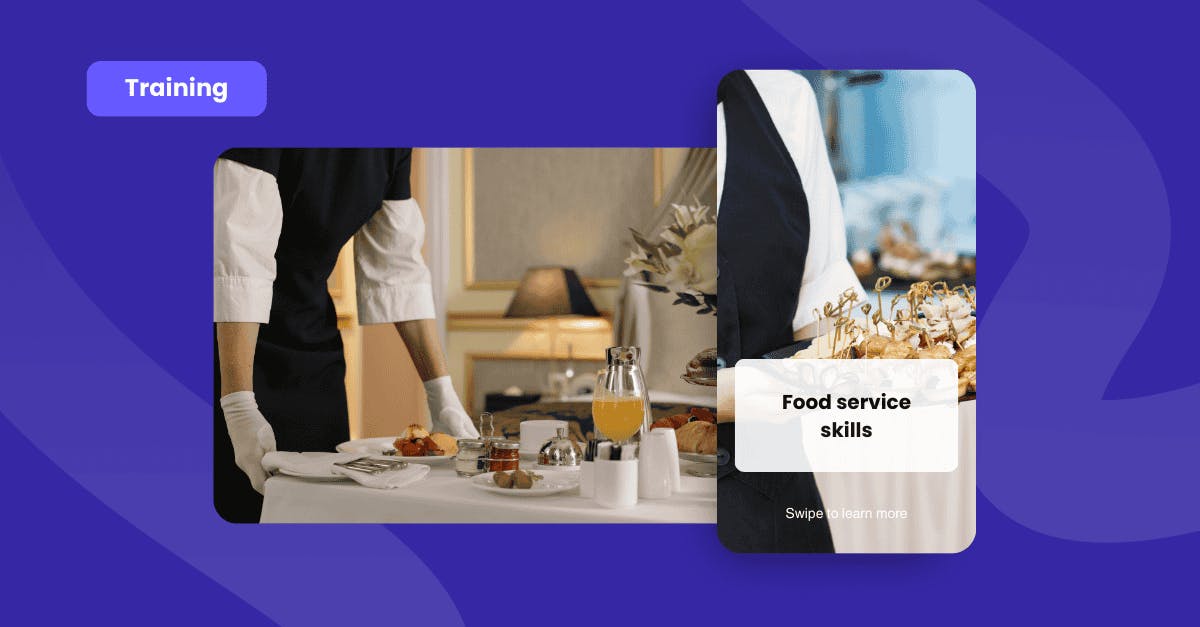10 Must-have food service skills for your teams
Food service teams need a well-balanced mix of soft and hard skills for smoother operations. From handling payments and understanding portion sizes to collaborating effectively and solving unexpected issues, these skills contribute to a positive dining experience.
Discover the food industry’s most sought-after technical and interpersonal skills. Learn what to prioritize to elevate your team’s performance with this curated list of the top food service skills.
What are food service skills?
Food service skills are the foundation of creating good customer experiences in the food and hospitality industry. They encompass a range of essential abilities that enable individuals to thrive in these establishments' fast-paced and customer-focused nature.
These skills are all about the seamless integration of interpersonal and practical competencies. For businesses, it’s crucial to train teams to enhance their food service abilities so they can adapt as the industry evolves. For employees, mastering food server skills helps open doors for professional growth and leadership opportunities.
10 Food service skills
Explore this list of the most in-demand skills for food service workers. Paired with expertly selected training courses, these are designed to elevate your team’s performance and help achieve your business goals.
Food service skill #1 - Menu knowledge
Leading our list is menu knowledge, a skill that directly impacts the overall dining experience. Servers who know the menu inside and out can take orders faster and more accurately. This helps reduce errors while streamlining the overall workflow. It also boosts the guest’s experience as staff can confidently recommend dishes and answer questions.
When servers are well-versed in the menu, they demonstrate professionalism and expertise. They also build trust among your customers. A server that can describe ingredients, preparation methods, or the origin of a dish shows that they care about the food they’re serving. It also helps them adapt quickly if a customer has dietary restrictions or preferences.
You can maximize eLearning platforms like SC Training to help your team understand their responsibilities in preventing food allergies. With interactive quizzes and scenario-based learning, its course on Allergies and Food Intolerance in Restaurants can equip your teams with the knowledge to handle allergens effectively.
Invest in expertise that makes a huge difference in customer satisfaction. Enhance your team’s food service skills with SC Training!
Food service skill #2 - Food safety practices
Food safety statistics show that the majority of foodborne outbreaks happen in restaurants. With so many people relying on food establishments for meals, it’s crucial to maintain high standards of cleanliness and hygiene to avoid contamination. This is why food safety practices are among the most important food preparation skills in the industry.
Training your staff on food safety including storing food at the correct temperatures. Washing hands frequently and handling raw ingredients safely can prevent foodborne illnesses and keep customers safe and healthy. It also protects your business from legal issues, fines, and reputation damage.
Lastly, when diners see that staff are following strict hygiene protocols and handling food carefully, it creates a sense of confidence in the restaurant’s commitment to quality and safety. This leads to repeat customers and positive reviews, which are vital for the success of any food service business.
Food service skill #3 - Point of sales (POS) system
The fast-moving atmosphere of hospitality requires food servers to be skilled in using POS systems for more efficient service. POS systems are essential in the ordering process as they allow servers to input orders quickly and accurately. It’s crucial for managing orders, handling payments, and communicating with the kitchen.
By equipping your teams with the skill to navigate these systems, servers can reduce errors and delays as the financial aspect of the transaction runs smoothly. This leads to a better experience for customers as your staff can focus more on interacting with customers and delivering excellent service. No fumbling on paperwork or relying on memory necessary.
As technology becomes an increasingly important part of the hospitality industry, mastering POS systems is no longer optional. Instead, it’s a must-have skill for every server looking to excel in a modern, dynamic restaurant setting.
Food service skill #4 - Customer service
Create a welcoming atmosphere for your diners by equipping your teams with the skills to deliver excellent customer service. Friendly and attentive service makes diners feel valued and appreciated.This increases the chances of customers returning in the future.
Positive customer interactions can turn a simple meal into a memorable experience, leading to word-of-mouth recommendations and online reviews. In today's competitive food service industry, these recommendations are invaluable. It can set a restaurant apart from the competition and play a pivotal role in its long-term success.
- Recommended courses: Creating a Positive Customer Experience, Guest Experiences
Food service skill #5 - Inventory management
Good inventory management allows restaurants to plan ahead and avoid disruptions. When your teams understand how to properly manage inventory, they can track ingredients, monitor stock levels, and avoid running out of key items during busy shifts.
This reduces waste, prevents over-ordering, and keeps food costs in check, which helps protect and improve your business’s bottom line. By regularly checking stock and predicting demand, food service teams can make smarter decisions about what to order and prevent last-minute rushes to restock.
Food service skill #6 - Empathy
Food servers should be able to put themselves in the customers’ shoes so they’re better equipped to understand and respond to their needs. This is where empathy comes in. It’s an important skill in the industry that is key to creating strong connections between your staff and your customers.
Whether it's recognizing when a diner is unhappy with their meal or noticing someone who may need extra attention, empathetic staff can make all the difference in turning a situation around. This emotional awareness leads to more positive interactions and can make customers feel heard and valued, making it an important addition to your restaurant staff training topics.
- Recommended courses: Operating with Empathy
Food service skill #7 - Effective communication
For front-of-house (FOH) staff like food service workers, effective communication guarantees smoother operations and helps prevent misunderstandings. Clear communication is key to keeping things running efficiently from relaying an order to informing customers about menu items.
Effective communication in the FOH helps manage customer expectations and build strong relationships. If a server can confidently explain a dish or answer a customer’s question, it helps diners feel more informed. This is especially helpful in tricky situations, such as a delayed order, where clear and prompt communication can smoothly resolve the issue and prevent frustration.
- Recommended courses: Serving Food, Active Listening
Food service skill #8 - Conflict resolution
In high-pressure, fast-paced settings like restaurants, misunderstandings are bound to happen. Whether it’s between team members or with customers, staff who are trained in conflict resolution can address issues calmly and professionally. This prevents small problems from escalating into bigger ones, helping assure that the customer experience remains pleasant.
Conflict resolution enhances customer satisfaction by addressing issues as they arise. For example, if a customer is unhappy with their meal or service, handling the situation with empathy and professionalism can turn a negative experience into a positive one.
By listening to concerns, offering solutions, and keeping a calm demeanor, food service professionals can maintain trust and leave a lasting good impression.
- Recommended courses: Handling Conflicts with Guests and Owners in Hospitality
Food service skill #9 - Attention to detail
To guarantee that every aspect of your diners’ experience is right, your food service team must master attention to detail. From taking accurate orders to delivering meals exactly as requested, small details make a big difference in customer satisfaction.
Paying close attention to things like dietary restrictions and special requests shows customers that their needs are being prioritized. Attention to detail also helps maintain the quality and consistency of service, particularly in busy restaurants where it’s easy to overlook things in the rush.
- Recommended courses: Food Runner’s Guide, How to be a Team Player
Food service skill #10 - Teamwork
Many hands make light work, particularly in the food service industry. In a restaurant, every team member from the kitchen to the front of the house, depends on one another to fulfill their roles. For servers, they need the kitchen staff to prepare the meals correctly and on time, while kitchen staff rely on them to deliver orders accurately.
When everyone works together, communication flows better, tasks are completed more quickly, and customers receive high-quality service. Teamwork also creates a positive work environment where people support each other. Whether it’s helping a coworker with a large table or covering a shift, strong teamwork fosters a sense of community and shared responsibility.
- Recommended courses: Getting to Know Your Restaurant’s FOH and BOH
Develop food service skills with top-notch training
Elevate your team’s food service skills and keep them passionate about the food they serve through SC Training. Deliver the ins and outs of service operations with high-quality food safety training for employees.
SC Training houses key features that make food service skills development a breeze for you and your teams. Check out its features below:
- Customizable food safety courses and more so you can tailor training to your restaurant’s specific needs.
- Real-time skill tracking with Practical Assessments for a digital checklist that helps you keep track of your team’s progress with digital training in person.
- Certificates for completing essential food service training to boost morale and credentials.
Build a powerhouse team with the right food service skills. Join SC Training today!
Author
Bea Garcia
Bea Garcia is a content specialist at SC Training, a cutting-edge e-learning platform commited to delivering experiences that empower frontline teams. She specializes in creating tailored content for the hospitality, retail, and SaaS industries, offering training solutions that address the unique challenges of each sector. Beyond writing, she spends her time trying out recipes and watching films.

